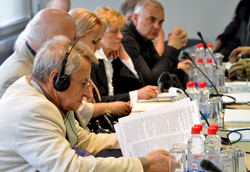
Media strategy to arrive in summer

The Serbian media strategy, that is currently being prepared by the Ministry of Culture, is to appear in the middle of July, said yesterday the assistant minister for the media, Natasa Vuckovic Lesendric. While participating in the two-day conference in the Media Center under the title "The Visegrad Four: Learning from Experience", she further clarified that the project "Media Study" will show how much the today's media scene in Serbia is harmonized with European standards.
Hungarian ambassador, Imre Varga, whose country is a member of the Visegrad Four (together with Poland, the Czech Republic and Slovakia), said while opening the conference that its main goal is to share the experiences in the area of media regulation and harmonization with European standards. The vice president of the Independent Journalists' Association of Serbia, Jelka Jovanovic, pointed out that Serbia has an unsatisfactory tradition of media legislation in its recent history, "from Seselj's law to the last year's laws to extremely bad amendments to the Law on Public Information".
The coordinator of the sector of independent journalists within the Association, Dejan Kozul, described in detail the recent research of public opinion and emphasized the fundamental problems related to pirate TV and radio stations, unregistered work, journalists who have not received their salaries for more than a year... The results of the research, which has mostly been focused on younger journalists, prove that the media employees in this category "are usually treated as expendable goods, not as a workforce", because media owners often use them to do their dirty work. 34% of interviewees said that their contracts on permanent employment did not specify the amount of salary, while in cases when the salary is specified, it is often not paid in full amount or is partially paid in cash.
The president of the Trade Union of Serbian Journalists, Dragana Cabarkapa, said that "many journalists are paid minimum wage, if at all". "Pension contributions are not being paid. Journalists cannot register their health care cards, while the employers who do not pay the contributions are not being properly punished. There is no law on mobbing, which would be very important for journalists", she pointed out and proposed that experts from journalistic associations write a new law on information.
Source: Politika, May 7, 2010. Page A7
Author: B. Bilbija
MC Newsletter, May 21, 2010
 |
| The content of this article does not necessarily reflect the view of the Media Center. The author bear full responsibility for the content of the text. |




